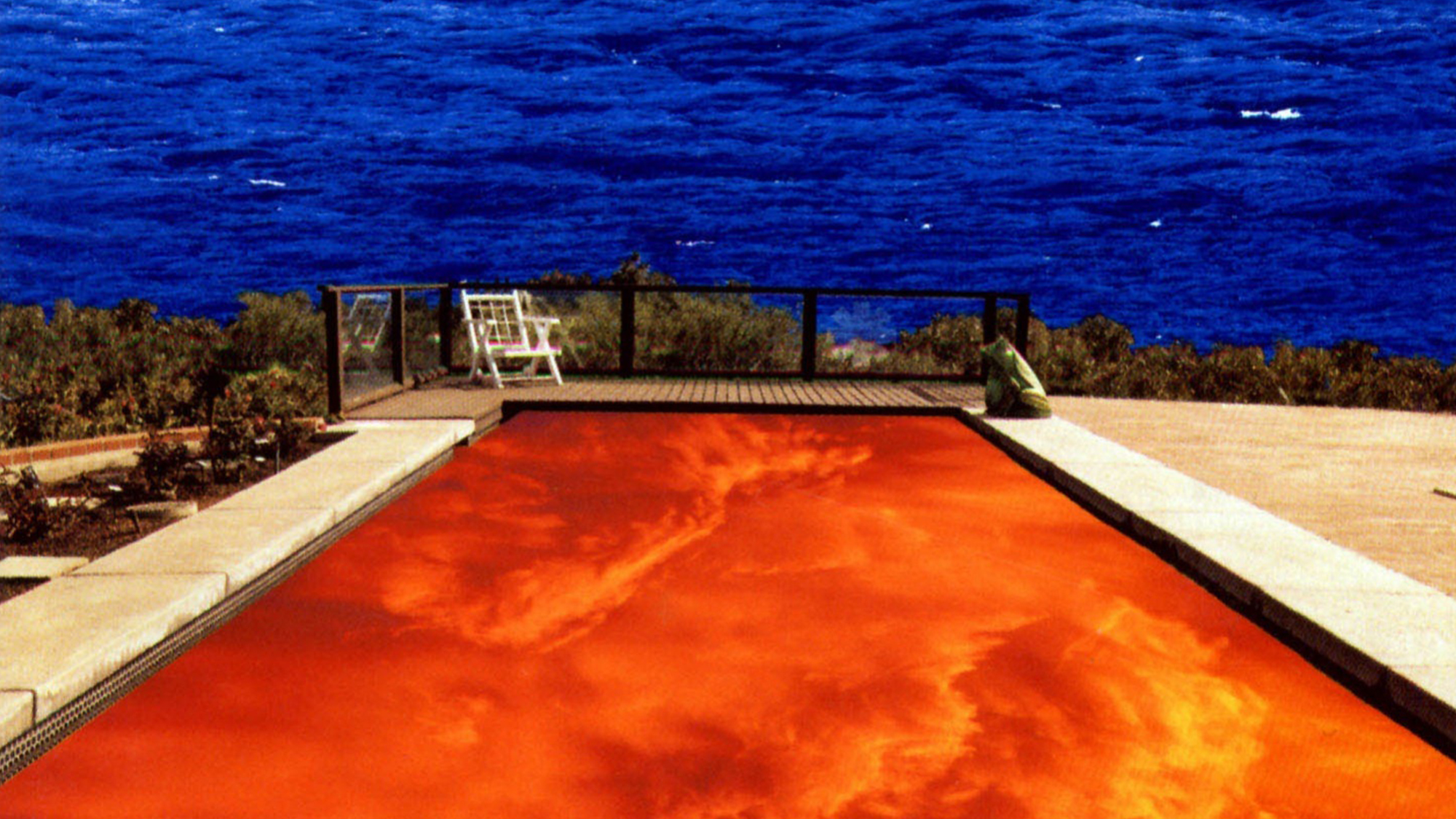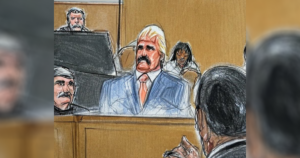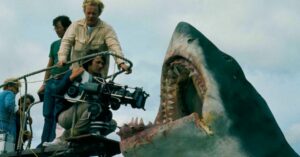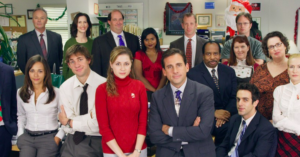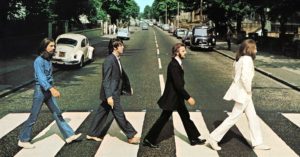In 1998, the Red Hot Chili Peppers were in a state of crisis. Their 1991 multi-platinum album Blood Sugar Sex Magik had transformed them into global superstars, but since then they had parted ways with guitarist John Frusciante and turned out the critically and commercially disappointing follow-up One Hot Minute with Jane’s Addiction guitarist Dave Navarro.
Yet just when it seemed like the Chili Peppers were doomed to fade into obscurity, they surprised the world by bringing John Frusciante back into the band and teaming up with legendary producer Rick Rubin to record an album that outsold even Sex Magik and permanently cemented the Chili Peppers as a staple of rock radio. This is the story of one of the greatest comeback albums of all time. This is the story of an album that almost never was. This is the oral history of Californication.
Chapter 1: Destruction Leads To A Very Rough Road

The addition of Navarro had changed the band’s sound and thrown off the magic formula that produced the breakthrough of Sex Magik, and the band’s other members knew it was time for a change. Though it was a difficult decision, the Chili Peppers fired Navarro in 1998.
Flea (bass): We knew it was time for a change. Dave is a great guy and a great guitar player, but he just didn’t have veiny enough arms to be a Chili Pepper.
Chad Smith (drums): The Chili Peppers’ whole thing is having super veiny arms. Sure, Dave has veiny arms by Jane’s Addiction standards, but we’re talking about the Red Hot Chili Peppers here. In this band, our arms are 99 percent veins. The other 1 percent of our arms is fingers.
Anthony Kiedis (vocals): We really didn’t want to do it. Kicking Dave out of the band was like having a beautiful wife who you love and then divorcing that wife because she’s so bad at guitar.
Flea: It was terrible, like putting a puppy to sleep immediately after telling the puppy it could play guitar in your band.
Chad Smith: Dave had no idea he was getting fired. The most recent song we’d written together was called “Dave’s In The Band For Life,” and the lyrics seemed to make it pretty clear he was in good standing with the band. For example: “Dave Navarro, you will go far-o / With our band-o, You are the man, yo.” But immediately after we recorded that song we started making plans to kick Dave out of the band.
Anthony Kiedis: We tried giving Dave a ton of really poor spelunking advice hoping he’d die in a cave so we wouldn’t have to fire him. It came close to working dozens of times, but unfortunately, the advice just wasn’t quite poor enough to seal the deal. Dave’s just too good at surviving in caves.
Dave Navarro (ex-guitarist): I’ll never die in a cave, no matter how poor the spelunking advice is.
Flea: It was like he was invincible in caves. We knew it wasn’t going to happen, so finally, we slid a note under his front door in the middle of the night that said “fired” and ran away like cowards. He was out of the band.
Dave Navarro: Yeah, they gave me a note that said “fired,” but that could have been about anything. I’m pretty sure I’m still in the band.
Chapter 2: But It Also Breeds Creation

With Navarro out of the band, the Chili Peppers got to work looking for a suitable replacement. They held a few auditions, but there was only one guitarist they really wanted: their previous guitar player, John Frusciante. But John had only recently kicked his severe drug habits and was uneasy with the attention that comes from playing in one of the biggest rock bands in the world, so bringing him back into the fold would prove challenging.
Flea: John was obviously the only suitable candidate to replace Dave, but we’d heard he’d sold his skin to a wax museum so they could use a damaged sculpture of Joe Piscopo as part of a Red Hot Chili Peppers display.
Anthony Kiedis: Yeah, I saw that Piscopo sculpture. They had stretched John’s skin over it like saran wrap so that it would look like a sculpture of John. It was hideous, with the face all stretched out and stuff, but I still kissed it. If I see a wax sculpture of John Frusciante, I’m going to kiss it, even if it looks like a monster.
Chad Smith: Skin or no skin, we wanted him back badly, man.
Anthony Kiedis: Due to some confusion, we ended up with that wax statue of Joe Piscopo as our guitar player for close to a year.
Chad Smith: That Joe Piscopo statue was terrible at guitar, but at least it looked like a hideous monster.
Flea: After realizing our mistake, I discovered that John had been living in a garbage dump specifically for mattresses that had been used to soak up massive sewage spills. So I grabbed my bullhorn, snuck into the bedroom that Anthony and Chad share, raised my bullhorn to my lips, and politely waited for them to wake up. The second Anthony opened his eyes, he looked at me and said, “Let’s head to the dump and look under mattresses for John Frusciante!” and we headed to the sewage mattress dump.
Anthony Kiedis: The flies in that place were so thick that we had to wear special masks that allowed us to breathe flies instead of air to go in there. But that wasn’t the worst of it. The only way we could get in there was to launch ourselves over the fence using a catapult.
Flea: The only guy we knew who knew anything about catapults was Dave Navarro, so we had to rehire him briefly.
Dave Navarro: I’m a catapult nut. There are only four people in the world who could build a catapult powerful enough to launch the Red Hot Chili Peppers over the wall of a dump, and I was one of them. The other three hate the Chili Peppers and would never do anything to help them, so I was their only option.
Anthony Kiedis: I’ve never seen a catapult like the one Dave built that day. He used all sorts of exotic wood, and the craftsmanship was impeccable. He really put his heart and soul into it. The second after he launched us over the wall we yelled over the wall that he was fired again.
Dave Navarro: Yeah, they yelled something at me like, “You’re fired, Dave!” but I think I definitely could have misheard it. They might have been yelling, “You’re fine, Dave!” That’s pretty nice of them to say. They’re nice guys. I’m pretty sure I’m still in the Red Hot Chili Peppers.
Chad Smith: The dump was filled with reeking, nasty mattresses. We didn’t know where to start. Finally, we saw a mattress labeled “Do not look underneath—too disgusting.” We looked under the mattress, and there was John.
John Frusciante (guitar): Ever since I left the band, I had been living under filthy mattresses and eating nothing but mattress moths and sushi for years. When the Peppers lifted up my mattress and found me, it had been so long since I’d been exposed to sunlight that it made my eyes throw up.
Chad Smith: John cleaned the vomit out of his eyes and came home with us.
Flea: When we got John back in the band, we had to know that he was going to stay clean before we allowed him back into the band, so to test him we disguised ourselves as drugs to see if he’d try to use us.
Anthony Kiedis: I tricked John into thinking I was a big bag of cocaine by hiding inside a big bag of cocaine.
Flea: I was pills. I taped pills to my face and quietly followed John everywhere he went.
Chad Smith: I was marijuana, man. I grew marijuana out of my arms and constantly waved them around in John’s face. But despite all the temptations, he stayed clean, man.
Anthony Kiedis: John proved that he had really cleaned up his act. We finally knew he was ready to officially rejoin the band when we saw him do a 1,000-piece puzzle without once starting to cry.
Chapter 3: Made In A Hollywood Basement

With John back in the band, he and Kiedis began to hole up together for days at a time discussing compositions and lyrical content. The album’s somber tone was inspired by both Frusciante and Kiedis’ struggles with addiction, and songs touched on subjects of drugs, lust, suicide, and, of course, California.
John Frusciante: I’d sold all of my music gear when I quit the band, so we had to pool together the remainders of several hundred Guitar Center gift cards to buy me a guitar to start working on writing the new album.
Anthony Kiedis: A lot of our early albums focused on the fun aspects of life, like changing your windshield wipers and finding out about popcorn for the first time at the age of 42. But John and I were going through men’s puberty and had become very crabby, so we wanted to do an album that dealt with the dark side of life.
John Frusciante: We wanted to do a grown-up album. We had become big grumps and were in the midst of men’s puberty. We tried putting the socks on our cocks to get in the mood to write some Red Hot Chili Peppers music, but it just didn’t feel the same. One, we had learned that socks are meant to be worn on feet, and two, we now hated having fun. The magic of our early, friskier days was gone.
Anthony Kiedis: The first song we wrote was “Scar Tissue,” and it contained a militant anti-fun message: “I can’t believe I ever chose to have fun. / I’m embarrassed by all the fun things that I’ve done. / Enjoying life is no longer for me. / I’m grumpy and cranky and I only eat while I pee.”
John Frusciante: “You can tell by my scowl that I’m totally bummed. / You can tell by my owl that my pets are not fun.” Beautiful, dark stuff. It was totally collaborative. Anthony wrote the first letter of every word, I wrote the rest of the letters, and then he went back over it and added the punctuation. We were working together like peanut butter and jelly, with Anthony and I both being the peanut butter and no one being the jelly.
Anthony Kiedis: The fact that we had to write more songs made us super pissy on top of how dehydrated we were from our men’s puberty. We weren’t inspired whatsoever. I’d sit there for hours looking at a breast I’d cut out from a Penthouse magazine that I kept in my wallet to try to get horny enough to write a sexy song, but all the noise from my puberty was killing my sex drive.
John Frusciante: We were about to scrap the whole thing when one day I asked Anthony if he thought we should take a vacation, and at the same time he asked me if I thought we should eat some cauliflower. We looked at each other and said in unison, “That’s it! Cauliflower vacation!”
Anthony Kiedis: We were immediately inspired. A concept album about a cauliflower vacation was the idea we were looking for. We shortened it to Californication to make it roll off the tongue better.
John Frusciante: We figured everyone would still get the point that this was a concept album about either taking a vacation from cauliflower or taking a vacation to a cauliflower-heavy area. We still aren’t sure which it is.
Anthony Kiedis: I almost quit the band because I had to add the word “Californication” to my spell-check dictionary because it kept getting underlined in red, and it took me, like, three minutes to figure out how to do it. Ultimately I solved the problem by throwing my computer in the garbage.
Flea: After Anthony and John had the basic tracks written, we started jamming in my garage so Chad and I could lay out the rhythms. My first thought when I heard the stuff that they’d been working on was, “Wow, I’ve never heard music that captures the reality of men’s puberty so perfectly.” It also made me very grumpy, which was exactly what they’d set out to do.
Chapter 4: Buy Me A Star

With the demos for the album completed, the Chili Peppers chose to once again enter the studio with legendary producer Rick Rubin, who’d produced their previous two albums. Under Rubin’s guidance, the Peppers began laying down the tracks for what would become their biggest album to date. But at the time, they weren’t so sure they had a hit on their hands.
Anthony Kiedis: Rick Rubin is a musical genius. He’s the type of producer who can listen to 15 seconds of a song and know whether or not it’s about wearing shorts. He eats, breathes, and sleeps rock ’n’ roll.
Rick Rubin (producer): The Chili Peppers and I are such close friends that I didn’t even make them fill out the form at RickRubin.biz/RicksPlace/record_with_rick.asp like I do other artists when they want to book studio time. When the band approached me and told me they had become grumpy and wanted to record an album that reflected their newfound crotchetiness, I was like, “Finally!”
Anthony Kiedis: Rick is amazing to work with. He encouraged us to sing a lot about padlocks so that we could get sponsored by a padlock company and get lots of free padlocks. It’s ideas like that that make him one of the few truly elite producers working today.
John Frusciante: Before I met Rick Rubin, I didn’t own any padlocks. But thanks to Rick Rubin, I now own 13,000 padlocks. That means I only need 15 more.
Flea: Once Rick was on board we finally stepped into Cello Studios in L.A. We spent the first six weeks in the studio memorizing where the bathroom was, but after that we were able to focus on the music.
Rick Rubin: The album was grouchy right from the get-go. The first track we started laying down was called “If You’re Here To Have Fun Please Show Yourself The Door.” I knew this was the album I’d been looking for to usher in a new era of sadness and despair.
Jim Scott (recording engineer): Rick wanted the album to sound really bummed out, so I had sad people hold the microphones instead of using stands. For the song “Around The World” I had an entire high school football team who’d just lost their coach to cancer hold the mic. For the title track, it was a group of women whose husbands had just left them for their sisters.
Chad Smith: In order to record the album, we moved our hands around on our instruments, Jim moved his hands around on the mixing board, and Rick nodded his head a lot. In the end, an album that we were really proud of came out from us doing all those things, man.
Chapter 5: Just Another Good Vibration

Californication debuted on June 8, 1999 and was immediately heralded as the band’s most mature offering to date. Critics and fans gobbled up the Peppers’ new, softer side, and the album and its singles skyrocketed up the charts.
Anthony Kiedis: I’ll admit I didn’t know how the album would be received. Would people be mad at us for doing a 180-degree turn on our feelings on having fun? Would they be mad we kicked out Dave? Would Dave, who still believed he was in the band, realize that we’d recorded an album without him? Luckily, in the end, I was able to make enough money off of album sales to afford never having to find out the answers to those questions.
Chad Smith: It was great to make a ton of money again. We’d come a long way from the band that would wear socks on our penises to protect them from sunburn and gnats. We’d gone through so much together: drug addiction, depression, men’s puberty, severe grouchiness, skinlessness… yet we were able to stick it out and make millions of dollars by making people sad. I think we did okay, man.
John Frusciante: I finally had enough money to buy Robocop. But I will never buy Robocop. Robocop needs to be free. He can’t belong to anybody because he needs to always be outside defending the people of Detroit.
Dave Navarro: I’m really proud of how Californication turned out. It’s probably our best album. I didn’t realize the band was recording the album until after it came out, so I bought a copy and then played some guitar in my garage while looking at the album cover. In a way, this means that I wrote all of the songs. I can’t wait to see what me and the rest of the Chili Peppers do next.
Rick Rubin: It’s great to have worked on the grouchiest album imaginable. I still have the chorus to “Scar Tissue” stuck in my head to this day: “Getting grouchy, Sitting on the couchy / Yelling at Jimmy Fallon, because he’s not talking loud enough for me to hear him.” I’m proud to have helped the Chili Peppers step on the throat of their fun-loving past and drive a bayonet into its heart, ending it once and for all.
John Frusciante: Those songs came together so beautifully. I was so happy I had rejoined the band. There’s just something about recording a multi-platinum rock album with your best friends that makes eating moths while living under a mattress seem bad by comparison.

